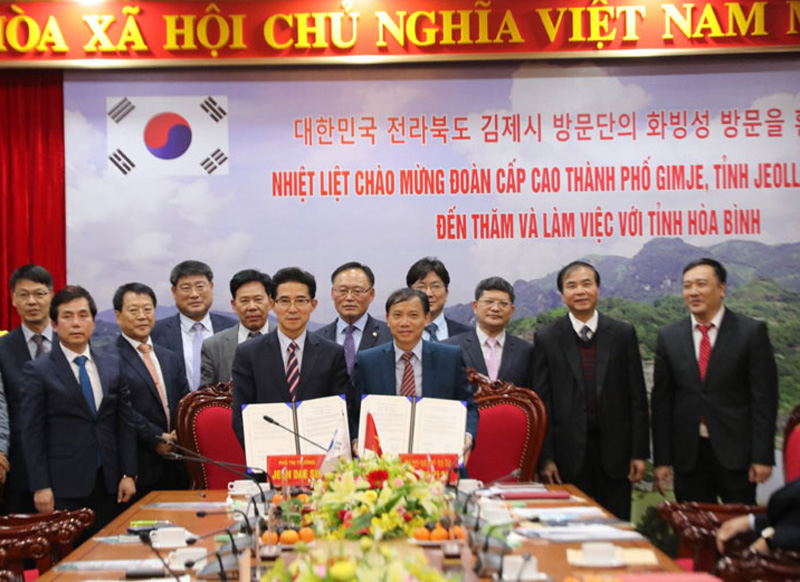
(HBO) - In compliance with the Party and State’s foreign policy of independence, self-reliance, peace, cooperation and development, active and proactive global integration, being a friend, a trustworthy partner and a responsible member of the global community, Hoa Binh province has paid attention to leading, directing and requiring Party committees to thoroughly grasp and seriously follow the Party and State's guidelines and policies on foreign affairs and global integration. The provincial People's Council and People's Committee launched various practical activities, thereby improving the efficiency of foreign affairs and people-to-people exchange.
 The province’s delegation visits Ho Chi Minh School No. 14
in Mongolia’s Ulanbato capital city.
The province’s delegation visits Ho Chi Minh School No. 14
in Mongolia’s Ulanbato capital city.
On the first days of 2020, local authorities hosted a
reception for a high-ranking delegation from Gimje city, Jeollabuk province,
the Republic of Korea.
At the working session, both sides signed an agreement on
friendly cooperation and exchange between the two provinces, under which they
will promote development via collaboration in science-technology, economy,
education and culture based on the principle of fairness and mutual benefits. The
two sides will actively work to conduct friendly cooperation projects and
others.
Last year, many meaningful external activities were held
effectively, leaving good impression on international friends, notably a
working trip to Mongolia’s Tuv province by a local delegation led by Vice
Secretary of the provincial Party Committee, Chairman of the provincial
People’s Council and head of the provincial National Assembly delegation Tran
Dang Ninh.
The meeting made important contributions to expanding ties
between Hoa Binh and Tuv provinces, in accordance with the memorandum of
understanding on cooperation signed by chairmen of the people’s councils of Hoa
Binh and Tuv provinces on January 22, 2018, in the fields of information
sharing, agriculture, cultivation and animal husbandry, exchange of visits to
share experience in fields of strength, science-technology, health care,
culture-sports, and people-to-people exchange.
The standing board of the provincial Party Committee built a
plan to implement the Secretariat’s Decree No.25-CT/TW dated August 8, 2018 on
promoting multilateral external relations till 2030; raising awareness of the Party
units, authorities, Party members and the public on the Party’s goals and
stance on multilateral external affairs; reaching high consensus and determination
on the field. The board also issued Regulation No.10-QC/TU dated September 17,
2019 on the management of external activities in the locality./.
Hoa Binh province is undergoing a dynamic transformation amid Vietnam’s national digital transition. Building on Poliburo’s Resolution No. 57-NQ/TW on breakthroughs in science, technology, innovation, and national digital transformation, the province has rolled out a wide range of practical action plans. A standout initiative is the "Digital Literacy for All” movement, an effort to ensure that no one is left behind in the digital era.
Hoa Binh province is undergoing a dynamic transformation in the wake of the national digital transformation movement. Building on Resolution No. 57-NQ/TW of the Politburo on breakthroughs in science, technology, innovation, and national digital transformation, the province has implemented a wide range of practical action plans. A standout initiative is the "Digital Literacy for All” movement ambitious effort to ensure that no one is left behind in the digital age.
With a spirit of unity and proactive problem-solving, the Party Committee, the government and the people of Dong Lai Commune (Tan Lac District) have made great strides in implementing the resolutions of the 24th Party Congress of the commune for the 2020 - 2025 term. Focusing on leadership and practical actions, the commune has brought the Party’s resolutions into daily life, creating strong impacts and pushing the local development forward.
Amid the nationwide push for digital transformation, young people in Hoa Binh Province are stepping up as dynamic pioneers, applying technology to enhance Youth Union operations and expand the reach of youth-led initiatives. Through creativity and adaptability, Youth Union organizations at all levels have introduced a series of practical solutions, contributing to modern governance and community development.
In recent years, An Nghia commune, located in Lac Son district, has stepped up administrative reform, focusing on improving the quality and efficiency of its single-window service unit for receiving and processing administrative procedures. These improvements have helped create favourable conditions for local residents and organisations to handle administrative procedures, contributing to the commune’s broader socio-economic development.
The Prime Minister-approved master plan to develop the multi-use value of forests ecosystems through 2030, with a vision to 2050, aims to improve the management and sustainable use of forest resources, create jobs, increase incomes, and improve the living standards of ethnic minorities, people in mountainous and remote areas, forest workers and those living near forests.



 The province’s delegation visits Ho Chi Minh School No. 14
in Mongolia’s Ulanbato capital city.
The province’s delegation visits Ho Chi Minh School No. 14
in Mongolia’s Ulanbato capital city.